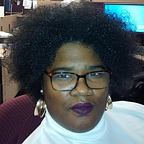To Be Young, Gifted and Black.
I first heard this song as sung by Nina Simone, who penned it; naming it after a play by the same name written by her close friend Lorraine Hansberry.
Aretha Franklin re-recorded it, and if anything in this world is going to resonate with your spirit, it’s listening to the voice of Aretha Franklin in her prime.
It’s a thing of beauty. But as it relates to this song, it isn’t just her vocal delivery, it is the message. And that is what I want to talk about today.
Inspiration that slowly grew repetitive and then silent.
As a child, I was unfamiliar with the words, but not with the sentiment. I went to an all-Black elementary school, merely a stone’s throw from the projects, but it was there that I learned to excel. In my school, there were only two men, the principal and the music teacher, so essentially generations of young Black children, were raised, shaped, crafted and cultivated by teachers who were Black women. These women knew how to recognize intellect in their students and nurtured it, tamping down the laziness of youth.
It was in this school I learned the satisfaction of academic achievement, as well as learning the pride associated with the achievements of those who have come before. In this school, we learned Black history, despite the fact…
